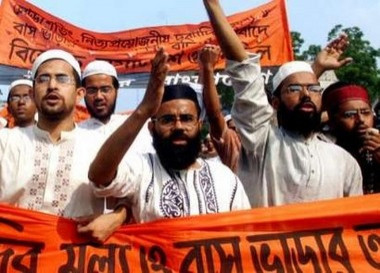Who Are Harkat-ul-Jihad Islami?

Harkat-ul-Jihad Islami (HUJI), the group that has reportedly claimed responsibility for the bombing Wednesday in New Delhi that has taken at least 11 lives, is an Islamic militant organization that has been active across South Asia for the past two decades.
The Indian National Investigative Agency is trying to determine the authenticity of an email sent by HUJI in which it threatened more attacks on high courts until the death sentence of Afzal Guru is overturned. Guru was convicted of a December 2001 attack on India’s parliament and remains on death row.
Based in Pakistan, HUJI (which means Islamic Struggle Movement) also has branches in Bangladesh and India itself.
The last known commander of HUJI was a man named Ilya Kashmiri, who was reportedly killed in June of this year by a U.S. military drone strike in North Waziristan in Pakistan.
Kashmiri was linked to al-Qaeda and was regarded as one of the fiercest militants in Pakistan.
The organization’s direct predecessor is believed to have been founded in the mid-1980s during the Soviet occupation of Afghanistan as a jihadist opponent to the Communists. After the Soviets departed, HUJI concentrated its operations in the disputed Indian state of Jammu and Kashmir, allegedly under the protection of Pakistan’s intelligence agency, ISI.
Espousing a Taliban-like, pan-Islamic ideology, HUJI sought to bring Kashmir into Pakistan’s fold.
HUJI also extended its presence to Bangladesh in the early 1990s, reportedly with the help of bin Laden himself.
The group was believed to be involved in a September 1995 attempt to bring down the government of Pakistan’s Benazir Bhutto, reportedly with the assistance of some of Pakistan’s top military officials, and establish a firmly Islamic state in the country.
Other reports claim HUJI also conspired to murder Pakistan’s President Pervez Musharaff and other senior government officials in Islamabad.
Similarly, in 2000, HUJI reportedly tried to assassinate the Prime Minister of Bangladesh Sheikh Hasina to impose a Islamic state there. HUJI was eventually banned by the Dhaka government five years later.
By 2010, the U.S. and U.N. also branded HUJI as a terrorist group.
However, many of HUJI’s activities have focused on India, including attempts to bomb the holy city of Varanasi, the destruction of Hindu temples; assassinations of Indian government ministers; terrorist attacks on Western targets in India; suicide attacks on Indian police; and various other bombings.
© Copyright IBTimes 2025. All rights reserved.





















